SPOTLIGHT WOMEN IN HEALTH
From test tubes to impacting lives — Dr Thesla Palanee-Phillips on making a difference with science
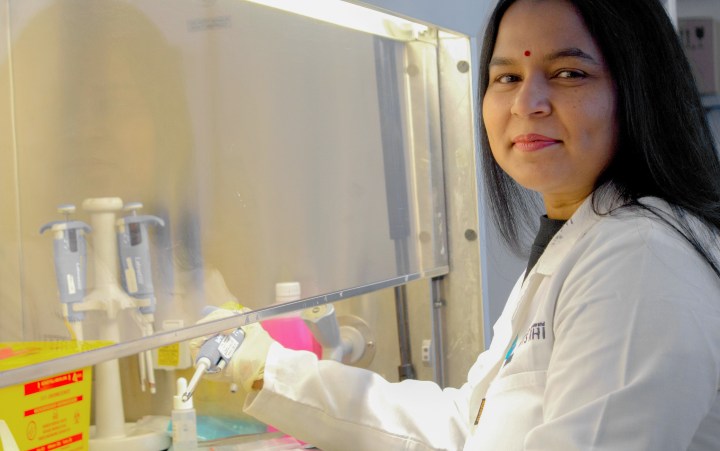
Dr Thesla Palanee-Phillips is the director of clinical trials at the Wits Reproductive Health and HIV Institute at the University of the Witwatersrand. As part of Spotlight’s Women in Health series, Elri Voigt spoke to her about what set her off into a career in science, the significance of the Aspire trial that she co-chaired, and juggling motherhood and her career.
‘It’s really, really rewarding to know that burning the candle at both ends — the hard days in the clinic, late nights, and taking calls — travelling throughout the African continent and taking these long trips to the US for meetings paid off,” says Dr Thesla Palanee-Phillips. “It’s just really humbling to know we were part of that work.”
The headline-making work the South African researcher is talking about is the Aspire study — a phase 3 trial of a vaginal ring used to prevent HIV infection. The ring contains the antiretroviral drug dapivirine. The ring has been widely hailed as offering women a means to protect themselves against HIV infection that does not involve taking pills or negotiating condom use. Spotlight previously reported on the ring here and here.
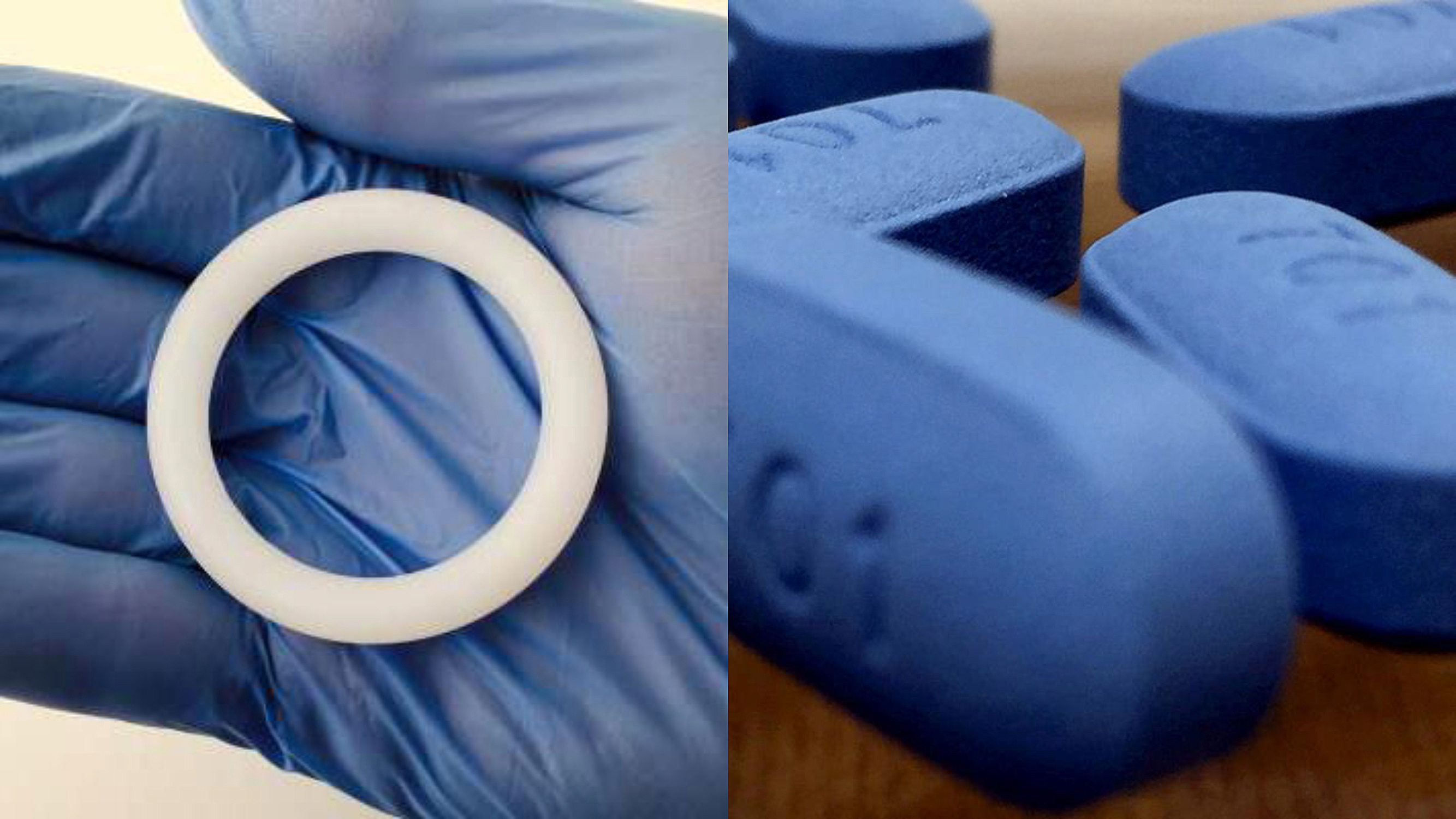
Dapivirine vaginal ring and tablets of oral PrEP medication. (Photo: NIH Image Gallery / Spotlight)
Reflecting on her career in an interview over Zoom, Palanee-Phillips says she considers the work on the dapivirine ring as a “turning point” in her career.
The Aspire study looked at whether the ring was able to prevent HIV infection in women. It found that overall, there was a 27% reduction in HIV infection among women in the vaginal ring arm of the study when compared with the placebo arm, as stated in this presentation at the Conference for Retroviruses and Opportunistic Infections (CROI) in 2016.
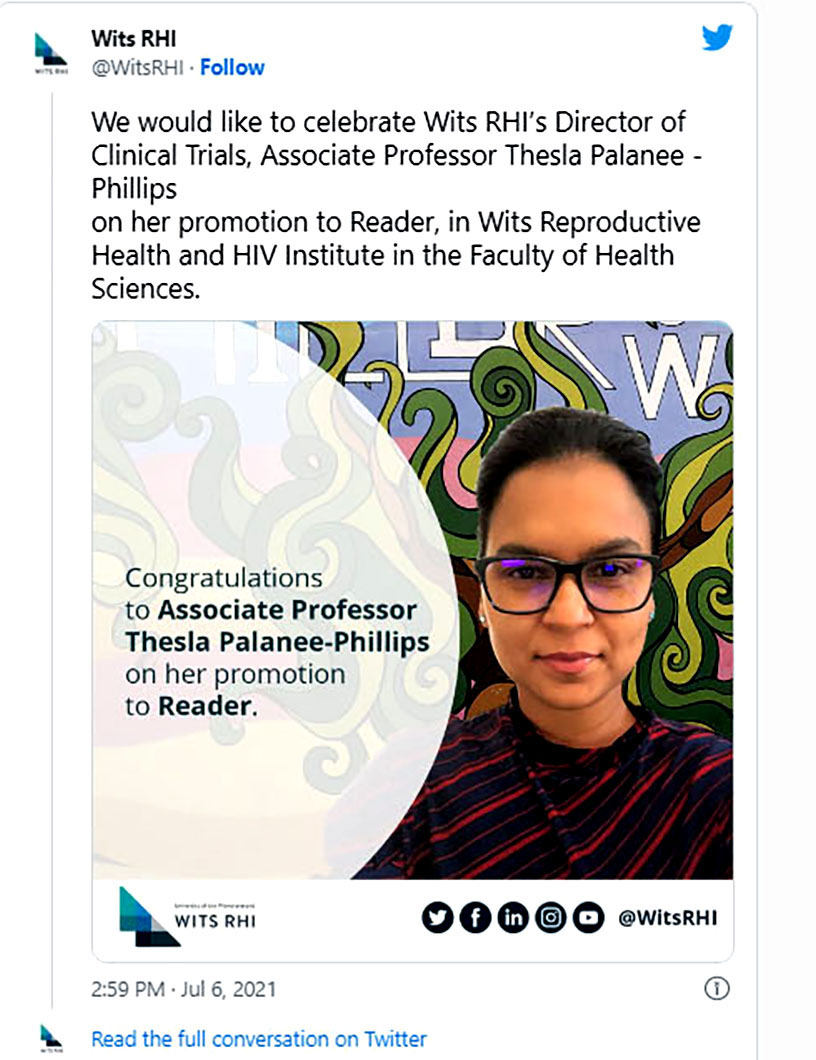
She says this study was pivotal in getting the dapivirine ring approved in South Africa. While the ring has been approved, it is however not yet available through the public healthcare system.
Her work as protocol co-chair in the study involved working alongside protocol chair Professor Jared Baeten to guide the implementation of the Aspire study at several research sites across Africa. Overseeing the research sites meant travelling to the different sites and “not just seeing report back, but seeing implementation in the real world”. Another aspect, she says, was meeting and working with donors, analysing the data as it comes through, both to inform best practice, but also to ensure the data is getting published.
She says there was a lot of work to be done and it was the busiest she’s ever been, but it was worth it.
A love of science
Palanee-Phillips’s journey to co-chairing a trial that made headlines around the world began in childhood when she says her love of science started.
Her initial plan, she says, was to work with animals, not people. “I wanted initially to be a vet — a veterinary surgeon. I love, love, love animals but I think at that time when it came to deciding on the career path it meant studying in Afrikaans,” she says. “So, thinking about doing tertiary education in a second language was daunting for me and so I kind of abandoned that dream and then decided to pursue the sciences,” she tells Spotlight.
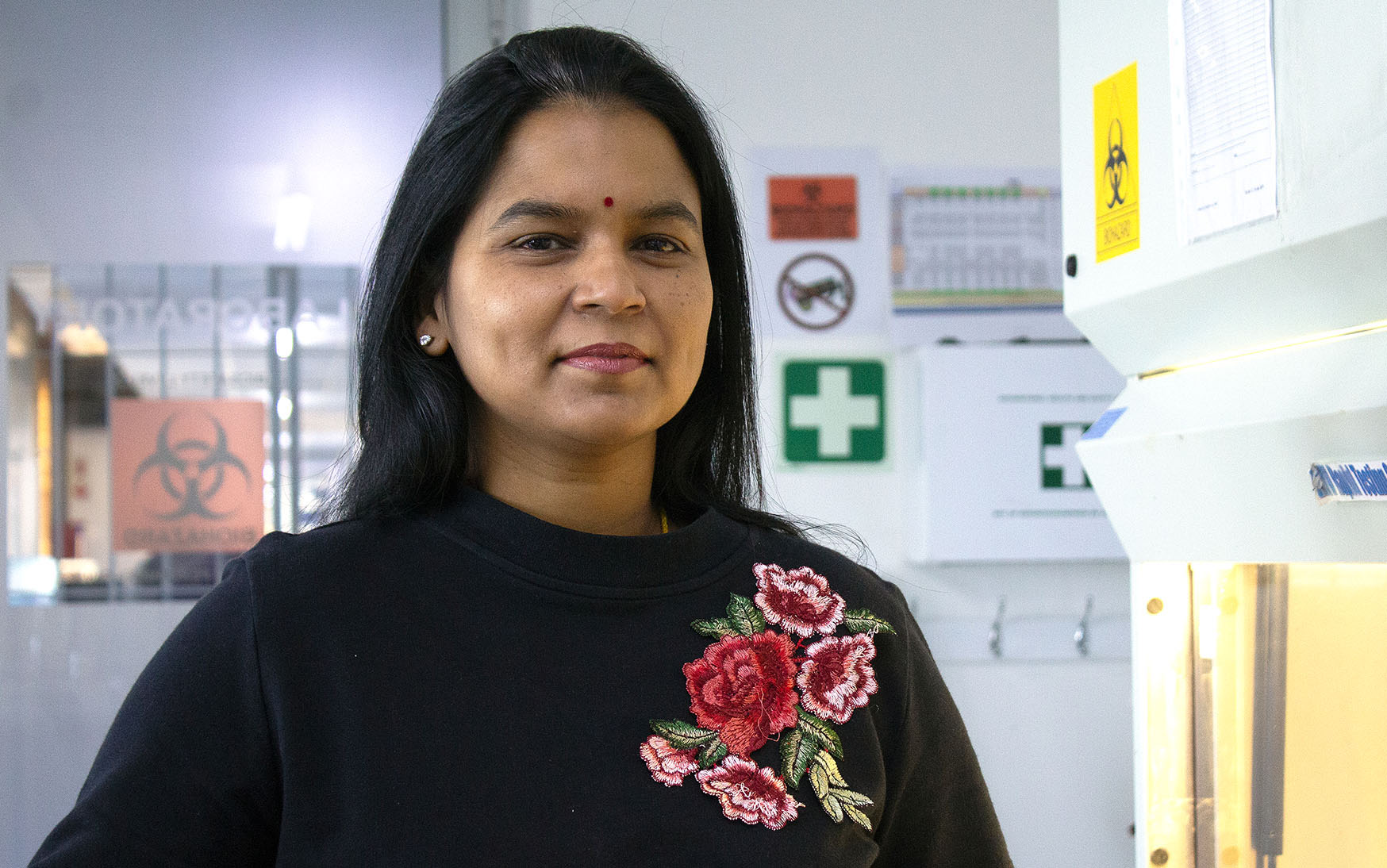
Dr Thesla Palanee-Phillips was protocol co-chair of the Aspire study — a phase 3 trial of a vaginal ring used to prevent HIV infection. (Photo: Supplied / Spotlight)
She went on to graduate cum laude with a Masters in Medical Science in December 1998 from the University of KwaZulu-Natal’s (UKZN) Nelson R Mandela School of Medicine and later obtained her PhD in Physiology/Biochemistry in November 2004 from the same university. Her post-doctoral experience was at the Department of Molecular Virology and Bioinformatics at the Africa Centre for Health and Population Studies based at the UKZN and in 2012 she received a Commonwealth Commission Scholarship to pursue a part-time, distance learning MSc in Clinical trials through the London School of Hygiene and Tropical Medicine in the UK.
It was during this time that the human sciences started to interest her and she realised she wanted to interact with people and be able to impact their lives.
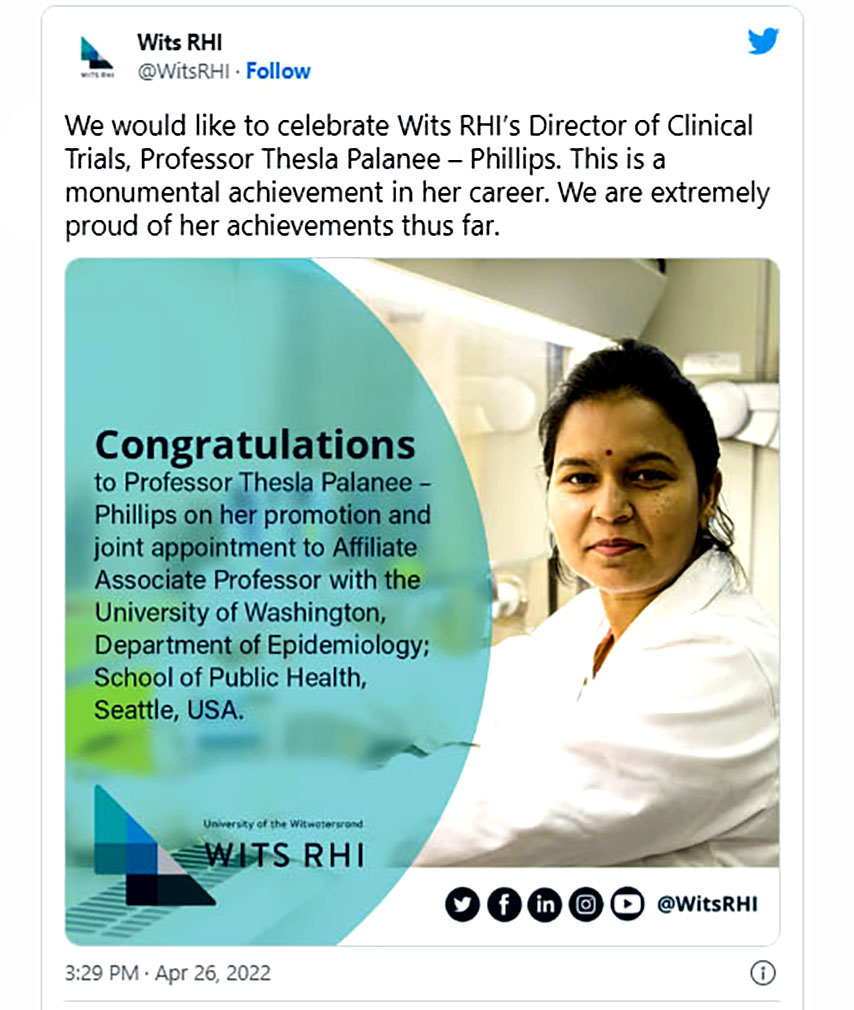
“The love [of science] came from that practical aspect of being a lab scientist by training, but then I reached the stage where I wanted to be on the other side of the bench, you know, really interacting with people, impacting their lives, and not just doing the test tube and the cell culture and animal model kind of stuff,” she says.
Today she is the director of clinical trials at the Wits Reproductive Health and HIV Institute — a position she’s held for a decade.
Visit Daily Maverick’s home page for more news, analysis and investigations
A ‘late bloomer’
A Hindu by birth, Palanee-Phillips says her name is not a common Hindu or Indian name, as her parents wanted to name her something a little different from the norm. The name Thesla, she says, came from a baby name book her mother carried around with her during pregnancy. Her mother kept gravitating towards the name and its meaning, which, according to Palanee-Phillips, is something along the lines of “word of god”.
But now, she says her family has taken to calling her ‘Stresla’.
“They call me Stresla because I’m a stress ball. Oftentimes my husband says it [my name] should have been Stresla, not Thesla,” she says, laughing.
Flipping between laughter and serious explanations comes naturally to Palanee-Phillips throughout our interview. One thing people may not know, she says, is that she qualified as an Indian classical dancer. “But you know, I don’t think I can dance in a cool way,” she says. “I don’t dance any more. I’m a bit too old,” she chuckles.
Palanee-Phillips was born and grew up with two older brothers in Chatsworth in Durban, KwaZulu-Natal, but her life is now in Johannesburg, where she says she misses the beach.
“When I had the twins, my parents moved their entire life to Johannesburg, where I’m now, to help with the girls and I wouldn’t survive without them. I’m very blessed to have both my parents still with me,” she says. The twins — two daughters — are now four years old.
She says because her daughters spent two years of their lives in Covid-19 lockdown, she and her husband are channelling their energy into showing their daughters more of the world. “But some of it [family time] means watching a lot of Paw Patrol,” she says, laughing.
Palanee-Phillips got married when she was 39 and refers to herself as a “late bloomer”. She says her journey to motherhood thereafter was not an easy one.
Years of IVF
“I had a horrible journey trying to have children. I had to go through about four years of in vitro fertilisation (IVF), then eventually conceived the twins and they were born in 2018,” she says. “It took a long time. I think [it was] one of the worst journeys of my life. I’m very blessed to have two little naughty girls right now,” she says. “I learn every day from these scamps. You know they keep us on our toes and we keep my parents busy as well. They help while I’m at work.”
Not enough people talk about infertility and IVF procedures, she says, adding that she herself is comfortable talking about it because she believes the more it is spoken about, the less stigmatised it will be.
Juggling it all
As for most women, juggling motherhood and work can be difficult. For her, this is made easier by the support of her family, she says.
“[My job] does take more hours than the day permits sometimes. It’s not an eight to five job,” she says. “But I also hold other roles within my portfolio of work and it changes pretty often. [For example] I hold a lab-director-type role within Wits RHI because of my medical science background. I sometimes forget how many hats I have on.”
At work, she is supported by a dedicated team of about 70 staff members, including doctors, nurses, scientists, counsellors and field workers. “All of them are incredibly dedicated, and so they help me.”
These days, she says, “I’m less of the do-er and more of the guiding person.”
As director of clinical trials, her work includes securing funding, providing oversight for research projects and growing the next generation of leading scientists and clinician trialists. But she says she prefers teaching in the form of leading through example as opposed to standing in front of a class and lecturing.
The best part of her job, Palanee-Phillips says, is being able to connect with the various study participants and members of the study teams.
“I think that the best part was just being able to connect to people and to know that the work that we do as a collective at the institute is really impacting lives,” she says. “[And] seeing people that have been on my team or at the institute for a period of time, grow and evolve, and you know — really come into their own.”
The worst part of the job? As director, she has to ensure that there is enough money to conduct the institute’s studies. “The stressful part is knowing that you have to pay salaries to everyone in your team. If you don’t bring in the money, you’re not going to pay people [and] you’re not going to do the research,” she says. “So yes, the best part is the human side and the worst side is also the human side because you take it [ensuring funding] on board, you take that responsibility on.” DM/MC
This article is part of Spotlight’s 2022 Women in Health series that is running throughout August.
This article was published by Spotlight – health journalism in the public interest.




















Comments - Please login in order to comment.